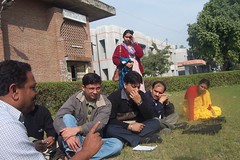Our bibliographic systems have not kept pace with changing environment around us - the Internet. The continuing proliferation of formats, tools, services, and technologies has upended how we arrange, retrieve, and present our holdings. Our users expect simplicity and immediate reward and Amazon, Google, and iTunes are the standards against which we are judged and rightly adjudged poorly.
Bibliographic Services Task Force (BSTF) [1] - The UNIVERSITY of CALIFORNIA LIBRARIES - has recommended following for keeping up the bibliographic systems compatible with the changing times:
I. Enhancing Search and Retrieval
-Provide users with direct access to item
-Provide recommender features Support customization/personalization
-Offer alternative actions for failed or suspect searches
-Offer better navigation of large sets of search results
-Deliver bibliographic services where the users are
-Provide relevance ranking and leverage full-text
-Provide better searching for non-roman materials
II. Rearchitecting the OPAC
-Create a single catalog interface for all of UC
-Support searching across the entire bibliographic information space
III. Adopting New Cataloging Practices
-Rearchitect cataloging workflow
-Select the appropriate metadata scheme
-Manually enrich metadata in important areas
-Automate metadata creation
Bibliographic Services Task Force (BSTF) [1] - The UNIVERSITY of CALIFORNIA LIBRARIES - has recommended following for keeping up the bibliographic systems compatible with the changing times:
I. Enhancing Search and Retrieval
-Provide users with direct access to item
-Provide recommender features Support customization/personalization
-Offer alternative actions for failed or suspect searches
-Offer better navigation of large sets of search results
-Deliver bibliographic services where the users are
-Provide relevance ranking and leverage full-text
-Provide better searching for non-roman materials
II. Rearchitecting the OPAC
-Create a single catalog interface for all of UC
-Support searching across the entire bibliographic information space
III. Adopting New Cataloging Practices
-Rearchitect cataloging workflow
-Select the appropriate metadata scheme
-Manually enrich metadata in important areas
-Automate metadata creation
